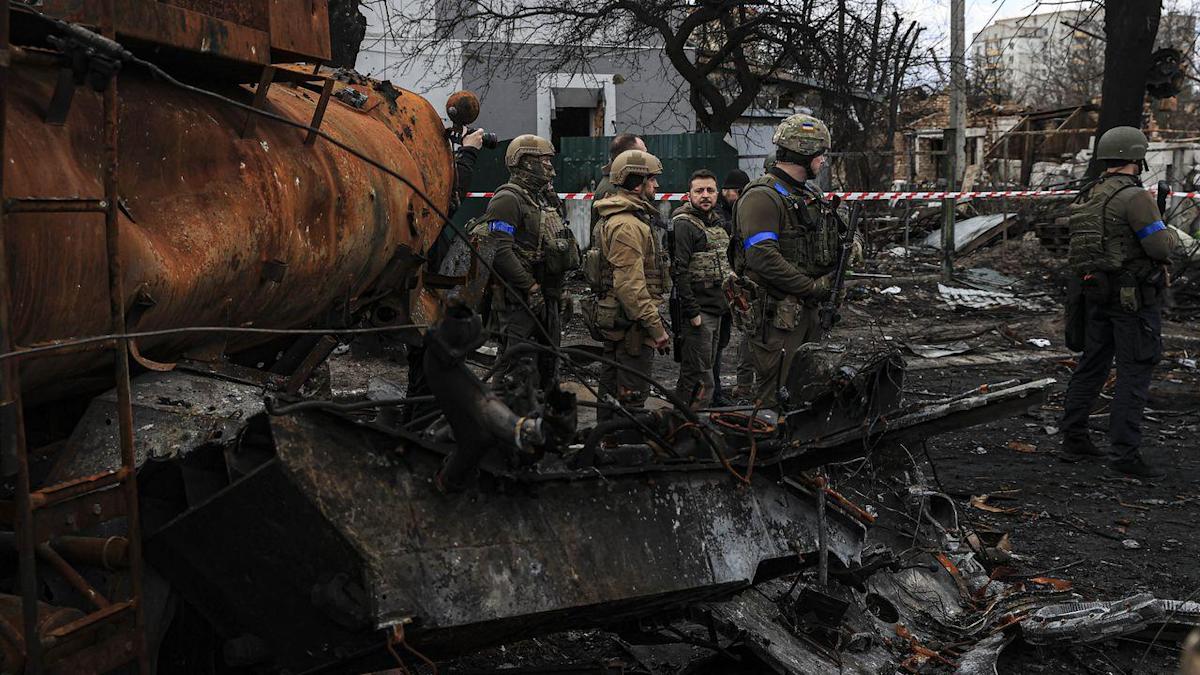
U.S. and European leaders Monday promised to respond to the discoveries of mass graves and other apparent atrocities in suburban Kyiv with harsher penalties for Vladimir Putin.
Why it matters: Western sanctions and arms shipments came in hard and fast after the invasion, with two key constraints: Europe’s reliance on Russian energy and the unwillingness of NATO countries to risk war beyond Ukraine’s borders. Their calculations may now be shifting, if only slightly.
Get market news worthy of your time with Axios Markets. Subscribe for free.
Driving the news: National security adviser Jake Sullivan said Monday afternoon that the U.S. will impose fresh sanctions after the discovery of what he described as war crimes in Bucha. Ukrainian troops retaking the city near Kyiv found civilians with their hands bound who had apparently been shot at close range.
-
Sullivan claimed that was not anomalous but “part of the plan” for a Russian regime intent on imposing “a reign of terror across occupied territories in Ukraine.”
-
Russia is pulling back from its positions near the Ukrainian capital. Sullivan said Russia was shifting its focus and its troops to the east, hoping to “surround and overwhelm Ukrainian forces” there.
-
Russian officials and state media have denied responsibility for the Bucha massacre and in some cases accused Ukraine of carrying it out (claims which are undermined by witnesses, journalists and satellite imagery).
Between the lines: The U.S. has already hit many of the obvious targets for sanctions, but steps such as removing all Russian banks from the SWIFT transaction system or enforcing secondary sanctions on oil exports are still possible.
French President Emmanuel Macron came out Monday in favor of new sanctions on Russian oil and coal — but he didn’t mention Russian gas, which accounts for 40% of Europe’s supply, Axios’ Zach Basu reports.
-
EU countries have paid Russia more than $20 billion for fossil fuels since the invasion began, and Russia is projected to earn $320.7 billion from energy exports this year — up 36% from 2021, per Bloomberg.
-
Momentum for a sanctions package that would ban oil and coal imports is growing, but European officials — including within Germany’s government — took contrasting positions Monday on whether now is the moment to take a hard line on gas.
-
Lithuania is moving forward on its own, becoming the first EU country to fully cease importing Russian gas.
More U.S. weapons, including drones and armored vehicles, are also on their way as part of a package announced Friday. Sullivan said further shipments would be announced soon.
-
NATO countries are showing increasing willingness to provide weapons that could allow Ukraine to go on the offensive, reportedly including tanks.
-
But they have yet to provide the types of aircraft and air defense systems that Ukrainian President Volodymyr Zelensky has been publicly lobbying for. A plan to send S-300 missile defense systems from Slovakia to Ukraine appears to have hit a snag.
President Biden said Monday that, in addition to providing Ukraine with weapons to continue its fight, it would also help document evidence for a future war crimes trial against Vladimir Putin.
-
Former International Criminal Court prosecutor Alex Whiting told Axios’ Laurin-Whitney Gottbrath that there is clear evidence of war crimes in Bucha, but “the challenge is going to be to prove who was responsible, and how high does this go?”
-
Whiting said it would be crucial to have investigators on the ground as soon as possible to talk to witnesses to try to determine which units were involved and who gave the orders.
Go deeper:
Like this article? Get more from Axios and subscribe to Axios Markets for free.




